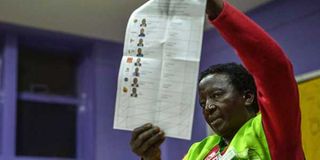It’s a case of crying for justice where none is to be easily found

An Independent Electoral and Boundatries Commission official counts ballots at a polling station in Nairobi on August 8, 2017. PHOTO | TONY KARUMBA | AFP
What you need to know:
- For over three decades, the Kenya Diaspora Alliance has mounted a spirited fight to be mainstreamed into the national system.
- In May 2015, the Supreme Court had ruled that the diaspora would vote, not just for the presidency, but all the seats.
- The IEBC ended up registering less than 3,000 diaspora Kenyans, barely 0.01 per cent of the 3 million.
Having unfairly been denied an opportunity to run for the Homa Bay senatorial seat by the Independent Electoral and Boundaries Commission (IEBC), I resorted to the courts seeking justice, only to encounter graver injustice.
For over three decades, the Kenya Diaspora Alliance (KDA) has mounted a spirited fight to be mainstreamed into the national system.
In this election, we had hoped that at least a million people would be registered to vote.
When it emerged in May that this was not to be, I am among the few diaspora Kenyans who decided to run.
In May 2015, the Supreme Court had ruled that the diaspora would vote, not just for the presidency, but all the seats.
It directed the IEBC to put in place “necessary infrastructure to register diaspora voters, and file annual reports with the Speakers of Parliament to that effect”.
HIGH COURT
Despite promises by the IEBC, this was not to be. In February, this year, we went back to the High Court, seeking to have the IEBC compelled to implement the Supreme Court order, and to cite the commission for contempt.
Unfortunately, Judge John Mativo did not give clear instructions, to the extent that despite filing under a certificate of urgency, the matter is yet to be heard.
The IEBC ended up registering less than 3,000 diaspora Kenyans, barely 0.01 per cent of the 3 million.
The IEBC had in March issued a gazette notice with guidelines for the aspirants. Indeed, notices issued on the diaspora kept changing.
I thus had to rely mainly on briefing by IEBC officers on the ground. The Homa Bay returning officer briefed aspirants on May 23, a day I was in Rwanda on official duty.
I had been preliminarily cleared and listed by the IEBC to present papers.
LITIGATIONS
My representative, himself a gubernatorial candidate, reported to me what later turned out to be wrong: on presentation date, and that fees could be paid in cash or banker’s cheque.
In all subsequent litigations I had to go through, up to the Appeal Court, the returning officer never denied misinforming the aspirants.
On May 28, at 4pm, I was surprised to receive a call that I was expected the next day to present my papers, while the day I knew was June 1.
Being a Sunday, I made frantic efforts to get my people to Homa Bay to make presentations, with all the stringent requirements IEBC had made.
Had I travelled myself, I would not have met most of the requirements, which were only executable from Nairobi.
BANKS CLOSED
At 3pm, May 29, the officer insisted my people had to get a banker’s cheque. By the time they got there, all banks had closed.
Only KCB was kind enough to let them in. Unfortunately, their franking machines weren’t working, and they were referred to Rongo town branch.
On returning an hour later with the cheque, the IEBC had closed, but the officer advised them to return the next morning.
For the next three days, they were stuck in Homa Bay waiting for instructions from the headquarters to receive the documents.
On June 1, I visited the IEBC’s Anniversary Towers headquarters in Nairobi and met the chairperson, who advised me to lodge a complaint.
COSTLY EXERCISE
I appeared before the IEBC Tribunal on June 4, but was dismissed on June 5. I appealed at the High Court, but was dismissed by Justice Jessie Lesiit, partly because we didn’t attach tribunal proceedings (which the IEBC had failed to give in time).
We later went to the Appeal Court. After a protracted, costly exercise, a bench chaired by Justice Erastus Githinji upheld the High Court decisions, contending that the regulations had been gazetted.
With the 2010 Constitution, we had assumed that technicalities used to deny justice had been vanquished.
It seems we still have a very long way to go. Chief Justice David Maraga has his work cut out for him. For now, justice in Kenya remains a far cry.
Dr Ochuodho, a former Rangwe MP, is the global chairman, Kenya Diaspora Alliance (KDA). [email protected]





